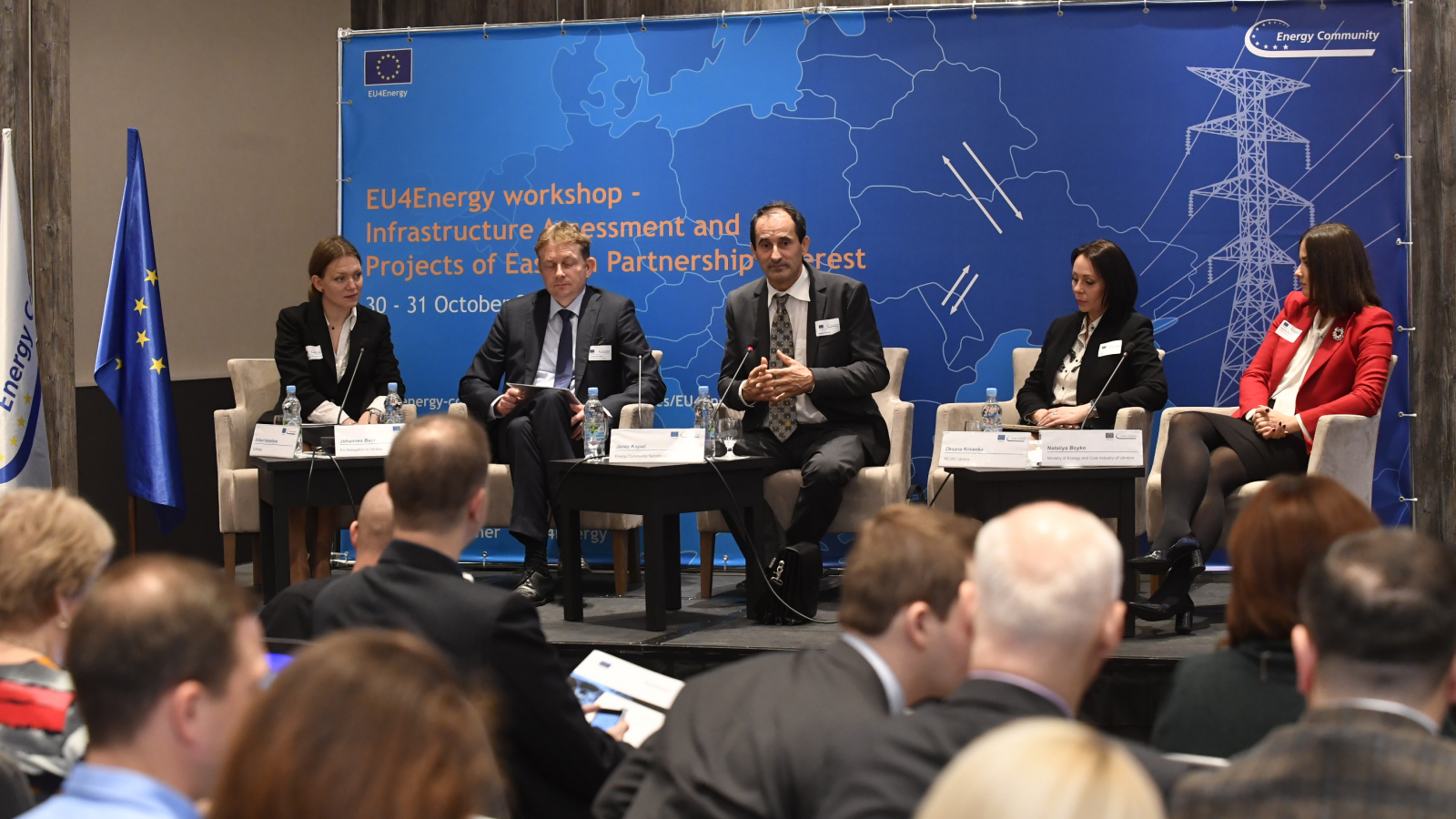
Cheaper and more reliable energy: How the EU helps Ukraine to improve its energy infrastructure
ხუთშაბათი, 17 იანვარი 2019 15:51Cheaper and more reliable energy: How the EU helps Ukraine to improve its energy infrastructure anna.iovchu Thu, 01/17/2019 - 15:51
How are the effectiveness of the energy sector and well-being of the country's residents connected? And how does the European Union help Ukraine to become non-volatile and energy efficient?
Energy Community experts discussed these and other issues at a recent seminar on the improvement of energy infrastructure planning in Kyiv.
How the EU helps Ukraine to reform its energy sector
Ukraine has committed to reform its energy sector in the framework of its cooperation with the European Union and the Energy Community. The energy sector needs to be reformed because the Ukrainian economy is very energy intensive. According to the International Energy Agency, Ukraine is among top energy consumers globally (26th place in 2015) and has an economy with one of the highest energy intensity. By comparison, neighbouring countries Poland, Slovakia and the Czech Republic have two-to-three times less energy intensive economies than Ukraine.
One of the programmes aimed at assisting Ukraine in this area is EU4Energy. Within the framework of the EU4Energy initiative, the EU assists Ukraine, as well as the other five Eastern Partner countries (Armenia, Azerbaijan, Belarus, Georgia and the Republic of Moldova), to reduce its energy dependency and decrease its carbon footprint. Through EU4Energy, the EU promotes more reliable and competitive energy supply, energy efficiency and the use of renewable energy sources.
Under the EU4Energy programme, the Energy Community Secretariat (ECS) assists Ukraine with enforcing EU legislation and implementing energy reforms.
EU4Energy's priorities in Ukraine
EU4Energy has several key priorities: improving energy statistics, analysing energy policy, improving legislation and regulatory frameworks, and improving access to information and communication between the EU and its partner countries.
This is achieved through financing projects and programmes aimed at reforming energy markets and reducing national energy consumption and dependence on energy supplies.
Ukraine has already made significant progress. In particular, with the support of EU4Energy in Ukraine, laws on energy efficiency in buildings, accounting and billing for heat energy have been developed.
One recent successful example is a technical assistance project launched in October to help Ukraine transposing Regulation (EU) 347/2013 on the guidelines for trans-European energy infrastructure. When transposed properly, this will help the country to attract more investments in energy infrastructure and achieve the goals agreed with the ECS.
The EU also helps to modernise energy infrastructure. In the long run, this makes energy supply more reliable and transparent.
Selection criteria for gas, electricity and oil infrastructure projects in Ukraine
In general, there are three types of projects that the EU can support: Projects of Energy Community Interest (PECI), Projects of Mutual Interest (PMI), and Projects of Eastern Partnership Interest (PEPI).
The ECS supports the process of selecting priority projects through the application of a specific methodology and criteria for assessing investment in cross-border electricity and gas transportation projects.
As an Energy Community member, Ukraine is already taking steps towards launching infrastructure projects of interest of the Energy Community (PECI and PMI). The projects are aimed at increasing the throughput capacity of interconnection lines with the European neighbouring countries such as Slovakia and Romania. They will allow Ukraine to obtain larger amount of power exchange with EU countries after the synchronisation with the Continental Europe Synchronous Area, operated by the transmission system operators of the European Network of Transmission System Operators for Electricity (ENTSO-E), foreseen in the next few years.
In addition, a programme has been developed with the technical support of EU4Energy which covers cross-border projects in the Eastern Partner countries that are not members of the Energy Community (Azerbaijan, Belarus and Armenia), as well as projects linking the Energy Community partners under the treaties (Contracting Parties) and the Eastern Partner countries (such as Ukraine with Belarus and Georgia with Armenia). These are the so-called PEPI projects.
The PEPI methodology will be used for infrastructure projects submitted by the EaP countries and project promoters for evaluation. As a result, a list of projects of interest for the Eastern Partnership countries will be formed.
So why is a separate programme needed, and how are projects for PEPI selected? “This is necessary because half of the Eastern Partnership countries are not members of the Energy Community, thus they are not eligible to participate in the PECI/PMI selection exercise” explains Adam Balogh, the gas infrastructure expert of the ECS.
Based on the Regulation 347/2013 on the guidelines for trans-European energy infrastructure, the methodology for assessing PEPI candidate projects has been adapted to the specific conditions and needs of the Eastern Partnership countries.
“The idea is that the selection procedure should be similar as for selecting Projects of Common Interest in EU, or Projects of Energy Community Interest,” explains Nenad Sijakovic, the electricity infrastructure expert at the ECS.
“We apply regional approach and conduct similar analysis as the national operators of the transmission system or the energy regulators would do on the national level. But with the help of the regional approach, we will be able to see benefits that cannot be seen at national level, as well as even identify a better solution for some of the known national investment needs. This will help the decision makers of the project promoters and the countries involved to take an informed decision about the projects” says Balogh.
Sijakovic, provides a number of criteria which are needed for a project to be analysed: “These should be projects related to the transmission or storage of electricity and natural gas, involving two or more Eastern Partnership countries.”
Difficulties that arise when implementing EU projects
It is not surprising that such important infrastructure projects are difficult to implement. The Director of the ECS, Janez Kopač, says that the problems often encountered during project implementation relate to complicated coordination processes with neighbouring countries, finding appropriate locations for infrastructure, and project financing.
Besides the abovementioned problems, Kopač highlights another issue in Ukraine: “These are very low tariffs for distribution and transportation. If we compare, for example, the gas price in Ukraine with the average gas price in Europe, then we realise that in Europe about 50% of the gas price consists of taxes, distribution tariffs, transportation tariffs, etc., while in Ukraine the cost of gas reaches 70-75% within the structure of the tariff. That is why infrastructure companies such as Ukrtransgaz, Ukrenergo, oblenergos, oblgases and others are not active players in Ukraine in creating new, efficient infrastructure.”
Benefits of the projects for Ukraine and achievements so far
When asked about the benefits, Kopač responds succinctly: “Any connection between the two parties is always good for stability and enhanced competition.” However, according to the Director of the ECS, not every connection brings immediate benefits for the development of the market:
“At the moment, Ukraine lacks liquidity in the gas and electricity market. So, if Ukraine, for example, connects to the so-called ‘Burshtyn Energy Island’ [meaning Burshtyn power plant, which is practically cut off from the rest of Ukraine's grid], which is already connected to the European grid, this will create additional liquidity for the electricity market in Ukraine,” he adds.
However, Kopač says that when it comes to gas, Ukraine does not need to create any additional infrastructure projects: “It is necessary to reconstruct the system of gas transportation, [and] equip it with more modern compressor stations, since many of those in place are obsolete and ineffective,” the expert notes.
Ambassador Hugues Mingarelli from the Delegation of the EU to Ukraine underlines that “the EU wants Ukraine to stay an important transit country for gas to the European Union. Therefore, the upgrade and rehabilitation of the existing gas infrastructure in Ukraine is important and is supported by the EU.”
In general, cooperation with the European Union should bring Ukraine a number of important benefits, such as the promotion of attracting investment, improvement of the quality of corporate governance, creation of jobs and enhancement of resilience to climate change. In addition, it will increase competition in the market, which in turn will prevent corruption. Another advantage is an increase in energy efficiency. This means reducing the consumption of gas and more manageable payments for the consumer.
Author: Uliana Bukatiuk
